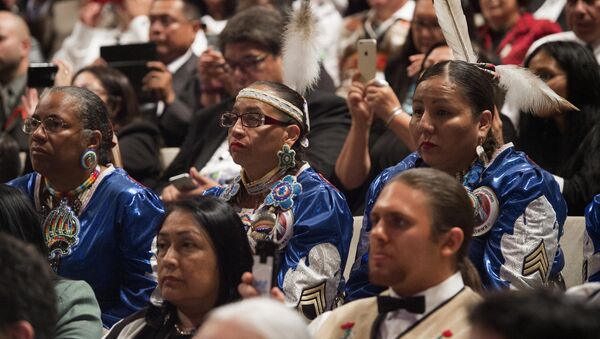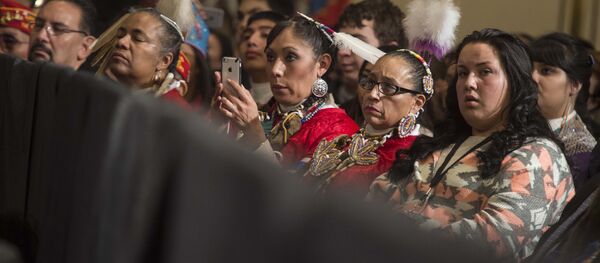The United States has 566 federally recognized Indian nations, 229 of which are located in Alaska and the rest in 33 US states.
They sit on land containing billions of dollars' worth of mineral reserves.
See how #tribal communities are doing their part to raise awareness for the health disparities Native people face → https://t.co/j4FinCdlEK
— Markwayne Mullin (@RepMullin) May 11, 2017
The Native American Affairs Coalition is run by Markwayne Mullin, a Republican Congressman from Oklahoma who is himself part-Cherokee.
Mullin recently told Reuters: "We should take tribal land away from public treatment. As long as we can do it without unintended consequences, I think we will have broad support around Indian country."
The coalition wants to hand much of the 56 million acres of tribal land to private companies, a potentially explosive idea.
It comes only months after last year's deeply divisive clashes over the Dakota Access pipeline, which finally began pumping oil on Sunday, May 14.
Native American reservations, although they are subservient to the US government and covered by federal law, are considered sovereign nations.
Trump met Native American leaders in December 2016, in a bid to establish better relations with them.
"I have certainly not heard any of the leadership of Indian Country being keen on this idea. Most tribes would be against it," Paul DeMain, the editor of News From Indian Country, told Sputnik.
He said Native Americans were deeply suspicious after centuries of being cheated out of their lands, including numerous treaties and the 1887 Allotment Act — sometimes known as the Dawes Act — which was widely abused by cunning landowners and mining companies.
DeMain said that in the 1950s a policy of "termination" led to 30 or 40 Native American tribes having their sovereign status suspended or terminated.
One of these was the Menominee tribe in Wisconsin and DeMain told Sputnik: "
Privatization was disastrous for them. They had no tax base to support roads of police or waste collection. Eventually they restored their tribal status, led by Ada Deer."
Ada Deer later became an Assistant Secretary of Interior under President Bill Clinton.
But DeMain said: "It's an example of what could happen depending on how they privatize. It depends if they mean taking communal land out of trust and selling it or encumbering it.
"Native Americans have a long history of supporting the Democrats, although many vote Republican in places like Oklahoma," DeMain told Sputnik.
Tom Goldtooth, who runs the Indigenous Environmental Network, said the water and earth was considered sacred to Native Americans and he added: "Privatization has been the goal since colonization — to strip Native Nations of their sovereignty."
Round dance at Trump Hotel represents "resistance" said Dallas Goldtooth of Indigenous Environmental Network #climatemarch pic.twitter.com/bhQiM8vOg3
— indianz.com (@indianz) April 28, 2017
Earlier this year National Congress of American Indians (NCAI) President Brian Cladoosby told Sputnik: "We look forward to this president coming out with a very positive pro-tribal sovereignty treaty rights respecting us as a sovereign state here in the near future."
He also said schools on Native American reservations needed a massive program of modernization, which could cost up to $388 million.



